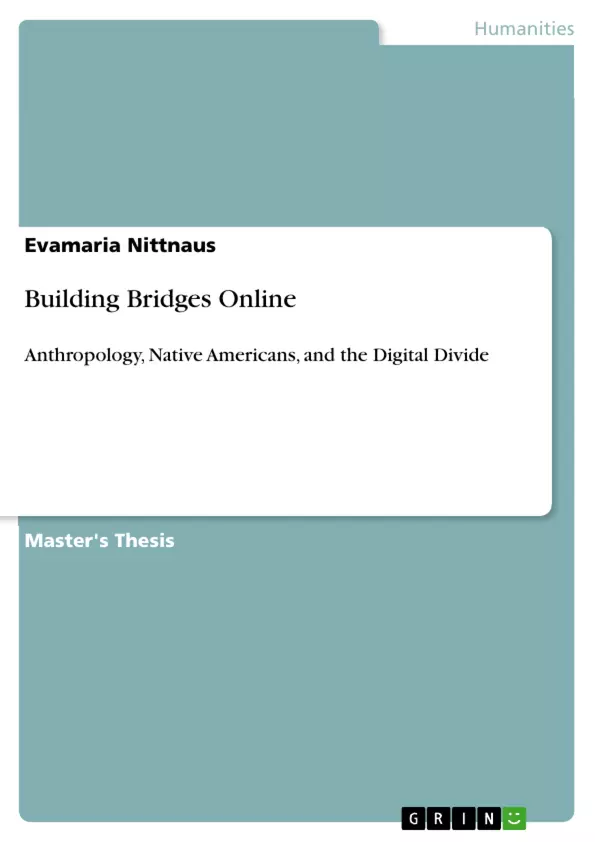
Building Bridges Online
Masterarbeit, 2006
107 Seiten, Note: 5.0 (out of 6)
Leseprobe
Inhaltsverzeichnis (Table of Contents)
- Prologue
- Part I: Introduction
- Taking Anthropology Online
- Studying the Digital Divide
- Statistics
- The Digital Divide Debate
- Appropriation instead of Marginalization
- Part II: Going Online
- Studying the Net: A How-To Guide
- "Native Americans": Some Remarks on Terminology
- Focus: Native American Internet Presence
- Some Problematic Issues
- Examples
- Oneida Nation
- Gila River Community
- Navajo Nation
- The 4D Project
- Further Examples
- Native American Webmasters: A Questionnaire
- Preliminary Remarks
- The Questionnaire
- Basic Information
- Native Americans and the Internet
- First Conclusions
- Part III: Bridging the Digital Divide
- Ethnicity Online: Using the Internet
- "Ethnicity": Choosing Appropriate Terminology
- Appropriating the Internet
- Some Numbers
- Chances and Challenges
- Closing the Gaps: Some Thoughts on Policy
- Digital Development
- Digital Democracy
- Digital Culture
- Digital Inclusion
Zielsetzung und Themenschwerpunkte (Objectives and Key Themes)
This thesis aims to explore the application of anthropological methodology to the study of online behavior, analyze the multifaceted nature of the digital divide, and demonstrate the potential of the internet for marginalized communities, focusing on the case of Native Americans. The author investigates how Native Americans, despite residing in a technologically advanced country, face unique challenges in accessing and utilizing the internet.
- The applicability of anthropological methods to online behavior
- The complex reality of the digital divide, with multiple dimensions
- The internet's potential for bridging the digital divide and empowering marginalized communities
- The unique internet experiences of Native Americans in the United States
- The challenges and opportunities associated with Native American online presence
Zusammenfassung der Kapitel (Chapter Summaries)
The prologue introduces the three main themes of the thesis: the use of anthropology in online research, the complexities of the digital divide, and the internet's potential for marginalized groups, exemplified by Native Americans. Chapter 2, "Taking Anthropology Online," discusses the relevance of anthropological perspectives and methodologies in studying online interactions and communities. Chapter 3, "Studying the Digital Divide," explores the statistical data surrounding the digital divide and the ongoing debate surrounding its definition and implications. Chapter 4, "Appropriation instead of Marginalization," delves into the possibilities for marginalized communities to use the internet to their advantage, highlighting the potential for empowerment and self-representation.
Chapter 5, "Studying the Net: A How-To Guide," provides practical advice and methods for conducting research online. Chapter 6, "Native Americans": Some Remarks on Terminology," discusses the complexities of terminology when discussing Native American communities. Chapter 7, "Focus: Native American Internet Presence," examines the presence of Native American communities online, including examples of online initiatives and the challenges they face. Chapter 8, "Ethnicity Online: Using the Internet," explores the use of the internet as a platform for ethnic identity expression and cultural representation, including the challenges and opportunities associated with this.
Schlüsselwörter (Keywords)
This thesis explores the intersection of anthropology, the digital divide, and the internet, focusing on the experiences of Native Americans in the United States. The key concepts include: online ethnography, digital divide, internet access, Native American internet presence, cultural appropriation, digital inclusion, policy implications, and online communities.
Details
- Titel
- Building Bridges Online
- Untertitel
- Anthropology, Native Americans, and the Digital Divide
- Hochschule
- Universität Basel (Ethnologisches Institut)
- Note
- 5.0 (out of 6)
- Autor
- Evamaria Nittnaus (Autor:in)
- Erscheinungsjahr
- 2006
- Seiten
- 107
- Katalognummer
- V179827
- ISBN (Buch)
- 9783656022862
- ISBN (eBook)
- 9783656023142
- Dateigröße
- 1320 KB
- Sprache
- Englisch
- Anmerkungen
- entspricht der Note 2,0 nach dt. Notensystem
- Schlagworte
- anthropology internet native americans digital divide media studies
- Produktsicherheit
- GRIN Publishing GmbH
- Preis (Ebook)
- US$ 38,99
- Preis (Book)
- US$ 50,99
- Arbeit zitieren
- Evamaria Nittnaus (Autor:in), 2006, Building Bridges Online, München, Page::Imprint:: GRINVerlagOHG, https://www.diplomarbeiten24.de/document/179827
- Autor werden
- Ihre Optionen
- Vertriebskanäle
- Premium Services
- Autorenprofil
- Textarten und Formate
- Services für Verlage, Hochschulen, Unternehmen

- © GRIN Publishing GmbH.
- Alle Inhalte urheberrechtlich geschützt. Kopieren und verbreiten untersagt.
- info@grin.com
- AGB
- Open Publishing
Der GRIN Verlag hat sich seit 1998 auf die Veröffentlichung akademischer eBooks und Bücher spezialisiert. Der GRIN Verlag steht damit als erstes Unternehmen für User Generated Quality Content. Die Verlagsseiten GRIN.com, Hausarbeiten.de und Diplomarbeiten24 bieten für Hochschullehrer, Absolventen und Studenten die ideale Plattform, wissenschaftliche Texte wie Hausarbeiten, Referate, Bachelorarbeiten, Masterarbeiten, Diplomarbeiten, Dissertationen und wissenschaftliche Aufsätze einem breiten Publikum zu präsentieren.
Kostenfreie Veröffentlichung: Hausarbeit, Bachelorarbeit, Diplomarbeit, Dissertation, Masterarbeit, Interpretation oder Referat jetzt veröffentlichen!
- GRIN Verlag GmbH
-
- Nymphenburger Str. 86
- 80636
- Munich, Deutschland
- +49 89-550559-0
- +49 89-550559-10
- info@grin.com
-










Kommentare